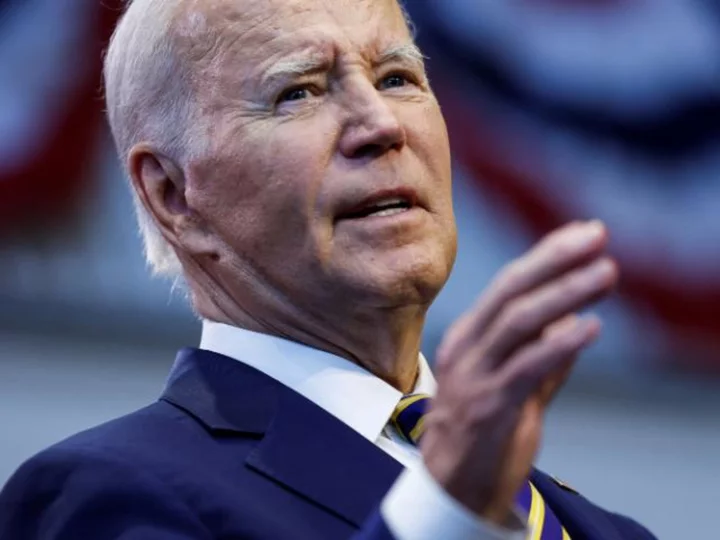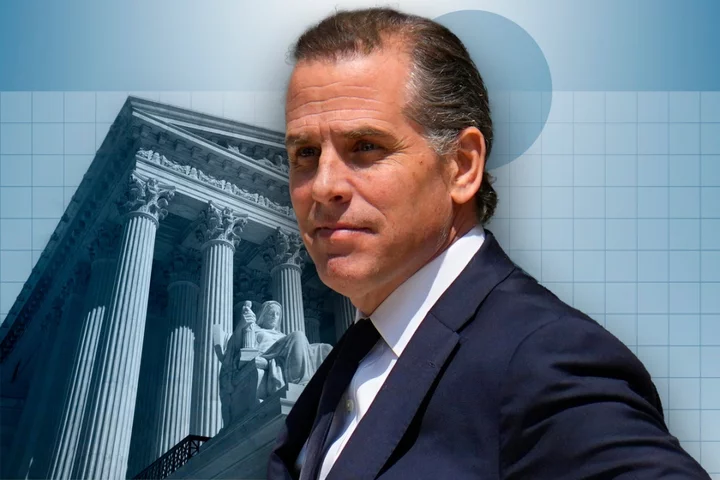
Marcus Freeman playing Mr. Nice Guy with Ryan Day ahead of Notre Dame-OSU clash
Marcus Freeman had some praise for Ryan Day before their two teams face off in a Top 10 matchup between Notre Dame and Ohio State in college football's Week 4.
2023-09-19 08:28

Owner of day care where toddler died of suspected fentanyl exposure dubbed ‘depraved’ in court hearing
The owner of a New York day care where a one-year-old boy died of fentanyl exposure was dubbed “depraved” during a court hearing. Youngster Nicholas Dominici died after he was exposed to the opioid at a Bronx facility on Friday, while three other young children were hospitalised. Daycare owner Grei Mendez, 36, and tenant Carlisto Acevedo Brito, 41, were arrested on charges including murder, manslaughter and assault. A kilo of fentanyl was found in a hallway closet outside Mr Brito’s room, which he rented from Ms Mendez for $200 a week, according to investigators. Prosecutors told a judge during a Sunday night arraignment hearing that Ms Mendez had taken part in the “reckless depraved act” by renting Mr Brito, her husband’s cousin, the room, reported ABC News. Her lawyer told the court that his client, who faces a sentence of life imprisonment if convicted, had no idea that drugs were being stored at the daycare. “Her only crime was renting her room to someone who had a kilo,” attorney Andres Aranda said. “There is no evidence that she did anything but care properly for these children.” Police say that drug production equipment was also found inside the daycare. Investigators believe that the children inhaled fentanyl particles during their daylong exposure to the drug before they were found unconscious and the alarm was raised. The judge said that Mr Brito, a national of the Dominican Republic in the country illegally, was a flight risk. He also said that Ms Mendez, who is not a US citizen and also has ties to the Dominican Republic, was a flight risk. Authorities are also looking to question Ms Mendez’s husband, who they say was captured on video fleeing the daycare with bags after the incident. “I love him, I miss him, I want him back – but there’s nothing that will give me back my son – when I came home from work and walked through the door, he’d say ‘daddy, daddy!’” Nicholas’s father, Otoniel Feliz, told ABC7. “My wife was on her way to the day care. She was going to pick him up early. Shortly before she arrives, she receives the call and also sees the ambulance.” Read More One-year-old child dead and three others hospitalised after daycare incident
2023-09-19 07:26

Who is being freed in the Iran prisoner swap?
Five Americans who were jailed for years in Iran were released in exchange for five Iranians.
2023-09-19 07:24

US plans to monitor $6bn to Iran. Experts are sceptical
Washington says it can police how Tehran uses the prisoner swap windfall. Analysts aren't so sure.
2023-09-19 06:26

Judge hopes to decide by Thanksgiving whether 14th Amendment disqualifies Trump from Colorado's 2024 ballot
A Colorado judge said Monday she hopes to decide by Thanksgiving whether the 14th Amendment's ban on insurrectionists holding office means former President Donald Trump is disqualified from the state's 2024 presidential ballot.
2023-09-19 06:26

Biden takes a political hit but brings Americans home
President Joe Biden's deal with Iran that unlocks $6 billion in Tehran's frozen funds to bring five imprisoned Americans home is creating the kind of terrible optics and an opening for his domestic foes that a politically weakened president can ill afford.
2023-09-19 02:48

What we know about 3 of the Americans who were released from Iranian detention
The release on Monday of the Americans who were wrongfully detained in Iran ends a years-long saga that included lengthy detentions in Tehran's notorious Evin Prison, which is known for its long record of human rights abuses.
2023-09-19 02:48

Jury rejects lawsuit after police fatally shoot man when going to wrong house
A federal court jury in Oxford, Mississippi, has ruled against a civil lawsuit filed by the widow of a man who was shot dead in 2017 by two police officers, while serving a warrant at the wrong address. Claudia Linares was seeking $20m in compensation for the death of her husband Ismael Lopez, 41. During the four-day trial that concluded on Thursday 15 September, the jury ruled that Southaven officers, Zachary Durden and Samuel Maze, did not violate Lopez’s civil rights. “The verdict was that the jurors did not believe that the use of force used by Officers Durden and Maze was excessive in light of all the facts that they considered,” Murray Wells, the attorney for Lopez’s family, said in a statement to WREG-TV. The case had previously attracted attention because the city tried to argue that Lopez did not have any civil rights as he was living illegally in the US and was facing deportation and criminal charges for the illegal possession of firearms. However, in 2020, a judge rejected the city’s claim, and ruled that constitutional rights apply to “all persons.” The Mississippi Bureau of Investigation reported that on 14 July 2017, Lopez and his wife were in bed when officers knocked on their door with the intention of serving a domestic violence warrant to a person who actually lived across the street. According to Mr Durden and Mr Maze, the pair did not identify themselves, and when the door opened, Lopez’s dog ran out and he pointed a rifle through the door. Officer Maze then shot the dog and Mr Durden fired multiple bullets at Lopez. He died after a bullet hit the back of his skull when he was six feet from his front door. Police have claimed he was running away from law enforcement, and a third office later told investigators that Mr Durden had ordered Lopez to drop his rifle several times before shooting him. Lopez’s lawyers stated in their argument that his fingerprints and DNA were not found on the rifle supposedly used to fire at Mr Durden, but believe the officer shot him in reaction to his colleague shooting the dog. They also called upon evidence that state investigators found his body lying in a prone position with his hands cuffed behind his back. There is no video footage to corroborate either claim. “Those officers used tactical maneuvers to hide themselves as police officers,” Mr Wells told WREG. “There are a couple of huge factors at play. One was this unbelievable mistake of going to the wrong address and we felt it was just incompetent because they didn’t even take the time to look at the boxes. They went to the wrong side of the road, so that started this. They never announced that they were police and at the end of the day Ismael Lopez was shot through a door, in the back of the head,” he said. Darren Musselwhite, mayor of Southhaven, praised the jury’s decision: “This verdict proves what we’ve believed to be correct since day one as our officers responded appropriately considering the circumstance of being threatened with deadly force,” he said. “We’ve stood behind them during the last six years for this very reason and, for their sake, are glad this trial is over.” Read More Police officer who fatally shot motorist charged with murder Philadelphia officer to be fired over shooting death of Black man as new video contradicts police account A Utah man was killed during a police traffic stop. His family say they’ve been ‘stonewalled’ by authorities
2023-09-19 02:47

‘Very rich, very famous, and very powerful’: How Bernard Tapie became France’s first tycoon – and wound up in prison
If you’ve grown up in France, Bernard Tapie is one of those people you’ve always been aware of, without being able to remember when you first heard about them, or what they’re currently famous for. In Tapie’s case, the answer varied throughout the years: at times, he was famous for his career as a businessman; at others, for his career in the world of sports. There was also politics, show business, and legal scandals, depending on when you asked. Only one constant remained: from his rise to fame in the 1980s to his death in 2021, Tapie was notorious. A new Netflix series dramatizes 30 years of his life, charting his humble beginnings, his not-so-humble early successes, and the biggest legal controversy of his life—for fixing a soccer game in favour of Olympique de Marseille, Marseille’s soccer team, which he then owned. In France, the show is simply called Tapie—a name known to virtually anyone. In the US, it’s titled Class Act, an apparent wordplay to nod both to Tapie’s exceptional destiny and to his status as what sociologist Pierre Bourdieu called a “transfuge de classe”—someone who moves from one social milieu to another. The show, comprising seven episodes, is a fascinating examination not just of the man himself, but of the country that allowed his ascent. It casts an eye back on the lionized men of the 1980s and asks: at what cost did we create them? And what are we meant to do with them now? “In the same way that there was Trump in the US, Berlusconi in Italy, there was Tapie in France,” Tristan Séguéla, who directed and co-wrote the series, tells The Independent in a video call. “The 1980s had a strong mythology around these characters who could embody everything, and who were very rich, very famous, and very powerful all at once.” Bernard Tapie was born in 1943 in Paris. His father was a laborer, his mother a nurse’s aide. He first sought fame as a performer, then in business. In the 1960s, he won a televised singing contest under the name Bernard Tapy—a much more American-seeming spelling of his last name. But that success was short-lived, and Tapie soon transitioned to selling televisions for a living. In the late 1970s and through the 1980s, he became known for purchasing companies on the verge of bankruptcy and reselling them for considerable profit. In the 1990s, he entered politics, as a member of President François Mitterrand’s government and as a Congressman. That same decade, he bought and sold the athletic apparel brand Adidas. The 1990s also saw Tapie’s biggest legal controversy: in 1995, Tapie was sentenced to eight months in prison for bribing members of the opposite team to ensure Marseille’s victory in a final match against Valenciennes. (Tapie had become the president of the Marseille team in 1986.) All of those events are depicted in Tapie. In real life, the story goes on, with more legal troubles (Tapie was sentenced to six months in prison for tax fraud in 1996) and more reinventions. To go through Tapie’s biography is to go through the story of a man who never retreated into anonymity and never stopped believing that the system would, in one way or another, bail him out. In the late 1990s and 2000s, he turned to acting and TV host gigs. In the 2010s, he became the owner of a media company. Tapie was diagnosed with stomach and esophagus cancer in 2017. He died of the disease in October 2021, aged 78. The actor Laurent Lafitte, who brilliantly portrays Tapie in the Netflix series and developed it with Séguéla, has spent time pondering Tapie’s story and what it represents. Tapie, he says in a phone call, was “a kid from the suburbs” raised in part by a Communist father. He views Tapie in that way in opposition to Trump, who long claimed to have received a “small” $1m loan from his father, “as if that were $10”, Lafitte says. Not only that, but that number is substantially false; Fred Trump’s financial support of his sum extended far beyond that sum. Tapie “did not have the same starting point as Trump at all”, Lafitte says, which, in his view, renders Tapie’s boundless ambition more palatable. But he is clear about Tapie’s “ultra liberalism”, and the way capitalism enabled his ascent: Tapie “bought failing companies and brought them back to financial health without concerning himself for the employees’ social wellbeing,” he says. Back in the 1980s, Tapie’s open ambition was considered “novel in France, where we have a rather discreet, reserved rapport with success, and especially with money.” In Tapie, Lafitte says, “we had someone who brandished material success as an absolute accomplishment.” The French language sometimes borrows words from English wholesale, not bothering to come up with a translation. “Fun”, for example, does not have a French equivalent. French people simply say “fun” with a French accent and carry on as usual. “Weekend” is another example. The words used to describe Tapie at various points in his career, Lafitte points out, do not have equivalents in French—there is no French word for “tycoon”, “self-made man”, or even “success story” (if one chooses to see Tapie that way). “These are English words that represent a kind of ultra liberal success that wouldn’t have been shocking for Americans, nor perhaps for some British people, back in the days,” Lafitte says. “But in France, it was really new.” Each episode of Tapie, the series, opens with a disclaimer that states the show is “inspired by real facts”, namely the big parts of Tapie’s life that were already known to the public. The show then takes liberties, imagining various scenes, giving viewers an interpretation of Tapie’s life rather than a date-by-date account. “Fiction worked [in the show] in the service of reality,” says screenwrite Olivier Demangel in a video call. He cites the German philosopher Theodor W Adorno, who, in reference to the works of Honoré de Balzac, wrote about “realism by way of losing reality.” “To me, that’s exactly it,” Demangel says. “[Adorno] was talking about Balzac, but we’ve always thought that Tapie had something of a Balzac character.” Not that the show is entirely disconnected from reality. To research the show, the team read around 40 books, Demangel says, and dug into television archives. “We really worked on the idea that Tapie was kind of the embodiment of television,” Demangel says. “Like a TV salesman who wanted to get inside the machine, and who sort of became television. We realized that he went through every television format, and that he had his downfall at the same time the world moved on to the internet. It’s as though the internet killed the world and Tapie.” Séguéla brought another real-world perspective: his father, Jacques Séguéla, was a prominent French publicist, and a friend of Tapie’s. The younger Séguéla has childhood memories of Tapie spending part of his vacations at the Séguélas’ house. “I remember someone who attracted attention,” he says. “And [Tapie] had one quality—I think it’s the same way with the friends of everyone’s parents: There are those who pay attention to kids, and those who don’t notice them. [Tapie] treated everyone equally, adults and children. I liked that, especially since he was already a media monster by the time he came by. I’d see him on TV, and then I’d see him make paella for everyone. And sometimes, we’d quarrel, too. He would argue with me about a bit of the Tour de France, or soccer teams. I liked that too.” Despite this personal connection, Tapie, before his death, had voiced his opposition to the series. More recently, his family voiced their objections, too. But that was never a problem for Séguéla, nor Lafitte, nor Demangel. They were determined to write the show, and they didn’t particularly want Tapie or his relatives to contribute to the writing. Years ago, Séguéla made it clear to Tapie that he wasn’t seeking his permission to go ahead, Tapie “left him alone” and let him work in peace, Séguéla says. “It would have annoyed me if he’d felt hurt by the show, if he’d found it insulting or defamatory,” Lafitte says. “But I was comforted by the fact that our work was mainly impartial.” Despite the differences between Trump and Tapie, the team too had Trump on the mind while crafting the show. “I would even say that Tapie must have had Trump on his mind during his own rise to fame,” Séguéla says. Tapie, Séguéla points out, published a nonfiction book called Gagner (“to win”), a cross between a memoir and a book of business tips. Tapie’s book came out in 1986. Trump’s own book, The Art of the Deal, came out in 1987—three years after Trump appeared on the cover of GQ. The 1984 cover story was titled: “Success: How Sweet It Is. Men Who Take Risks and Make Millions.” Now, Lafitte struggles to imagine France’s other wealthy men, such as businessmen François-Henri Pinault or Bernard Arnault sing on TV or host a show—both things Tapie did. Still, Tapie’s story as told in the Netflix series seems inseparable from France itself. In Tapie’s tale, Lafitte sees “all the contradictions” of the country’s attitudes to success. “In France, we always tend to be wary of people who succeed materially,” he says. “[Tapie’s story] is the story of a time when the line became a bit more blurry, between [the traditional French mindset] and a more American mindset. He understood that very quickly.” Read More Like Harry, they wrote brutally honest memoirs about their families. What happened next? From Harry Styles to Emma Roberts: How celebrity readers became the book influencers we didn’t know we needed Slim Aarons started out photographing war – but his greatest assignment was in the trenches of fashion Hurricane Nigel expected to ‘rapidly intensify’ by Tuesday - latest Trump says he doesn’t worry about jail risk as he refuses to rule out self-pardon Front door of home where Sharon Tate was murdered sells for $127k
2023-09-19 02:20

Person detained in ‘ambush’ killing of LA sheriff’s deputy
A person has been detained in connection with the fatal shooting of a Los Angeles County sheriff’s deputy who was shot over the weekend in what authorities say was a targeted killing. Deputy Ryan Clinkunbroomer, 30, was on duty Saturday night and sitting in his patrol car at an intersection in Palmdale, California, when he was ambushed, Sheriff Robert Luna said in an earlier press conference. “He ambushed and killed — murdered — one of our deputies,” Mr Luna said, describing the suspect as a “public safety threat.” The sheriff announced on Twitter Monday morning that a person has been detained, but further details were not immediately available. A press conference is set for later today. Police said there was video that captured a vehicle described by Mr Luna as a 2006 to 2012 dark grey Toyota Corolla driving next to Clinkunbroomer’s patrol vehicle at the time of the 6pm shooting. The sheriff released photos, calling it a “vehicle of interest.” Mr Luna added that Clinkunbroomer had gotten engaged just four days before the incident. “He was just starting his life,” the sheriff said. The sheriff also released a statement on Facebook, writing that the “eight-year veteran of the LASD” was “senselessly murdered tonight.” “From everything I know about Ryan, people absolutely loved and adored him. He wasn’t just one of our Deputy Sheriffs. He was a third generation deputy. His father and grandfather served with us,” the statement read. “Service was running through his veins. He embodied the values of bravery, selflessness and was committed to justice. Our deputy was a devoted family member and a cherished community member. He was cowardly shot while working tirelessly to serve our community this evening,” the sheriff added. Read More LA sheriff’s deputy shot dead inside patrol car in targeted ‘ambush’ days after marriage proposal A Mississippi jury rules officers justified in fatal 2017 shooting after police went to wrong house Minnesota man acquitted of killing 3 people, wounding 2 others in case that turned alibi defense
2023-09-18 22:45

Is Hunter Biden’s gun case a test for the Second Amendment?
Following a five-year federal investigation, a grand jury has indicted President Joe Biden’s son Hunter Biden on three charges connected to a gun purchase in 2018, a time period during which the president’s son has admitted to using drugs. Federal law prohibits people who use drugs from buying firearms, but questions surrounding the constitutionality of that law could throw the case into jeopardy following a landmark US Supreme Court decision that opened a wave of litigation under the court’s expansive Second Amendment lens. That’s if the case survives the political maelstrom targeting the Biden family, with congressional Republicans eager to prosecute the president’s son and impeach his father in parallel probes separate from a US Department of Justice special counsel investigation facing GOP pressure. That partisan scrutiny comes as the leading candidate for the 2024 Republican nomination for president faces four sprawling criminal trials of his own, including charges for serious crimes allegedly committed while serving as 45th president. Republican officials and campaigns are eager to draw a false equivalence and dominate airtime with investigations surrounding the younger Biden instead. Ironically, a Supreme Court decision celebrated by Republicans last year may have set a precedent that could protect Hunter Biden from prosecution. The Gun Control Act of 1968 prohibits people who use drugs from possessing firearms, a ban that applies to people who have admitted to using illegal drugs within 12 months before buying a gun, according to the US Bureau of Alcohol, Tobacco and Firearms. Violating that provision could land an offender with a 15-year prison sentence. But the Supreme Court’s decision in New York State Rifle & Pistol Association v Bruen – decided by the court’s six conservative justices – argues that such restrictions be historically consistent with the Second Amendment. As Justice Clarence Thomas wrote, “the government must demonstrate that the regulation is consistent with the Nation’s historical tradition.” The decision created an absurdly high new burden to test the constitutionality of restrictions and other safety measures to combat the proliferation of high-powered firearms and keep them out of the hands of people who could be a danger to themselves or others in the American era marked by daily mass shootings and surging rates of gun violence, analysts and advocates have argued. President Biden has said the decision “contradicts both common sense and the Constitution.” Within a year after that decision, more than a dozen state and federal gun laws have been challenged, with 30 per cent of civil cases and nearly 4 per cent of criminal cases citing the Bruen decision in challenges that have invalidated gun control measures, according to research in Duke Law Journal. This year, federal judges in several cases have ruled that banning someone who uses drugs from owning a firearm is “inconsistent with the Nation’s historical tradition of firearm regulation.” “In short, our history and tradition may support some limits on an intoxicated person’s right to carry a weapon, but it does not justify disarming a sober citizen based exclusively on his past drug usage,” Ronald Reagan-appointed US District Judge Jerry Smith wrote for a federal appeal courts panel in August. “Nor do more generalized traditions of disarming dangerous persons support this restriction on nonviolent drug users.” Hunter Biden is charged with illegally owning a gun as a drug user, and with allegedly lying on a form when he bought the firearm. If convicted, he could face up to 25 years in prison, though it is highly unlikely he would face such a sentence. Jacob Charles, a professor at Pepperdine University’s Caruso School of Law and a constitutional law scholar focusing on the Second Amendment, said Mr Biden’s attorneys likely have a viable Second Amendment case. It might be more difficult to challenge federal law against lying on a firearms form, which is not directly tied to Second Amendment rights, “so it’s possible that an appeals court or the Supreme Court would agree with the defense on both of the questions, and say it’s unconstitutional, and since it’s unconstitutional, you also can’t be punished for lying about the other category,” Mr Charles told The Independent. Essentially: if one count is on unconstitutional grounds, there’s a chance the other counts wouldn’t stand up either. “It’s not always the case that the higher profile the defendant, the more likely you’re going to get Supreme Court review,” he said. “Sometimes it seems to happen lately. But there are other cases that are farther along in the process that are challenging this same law, that if the court really wanted to answer this question, it wouldn’t have to use the Hunter Biden vehicle to do it.” Mr Charles says the case has underscored the “disruptive effects of the Supreme Court’s decision in Bruen” and the chaotic new landscape for the nation’s myriad gun laws, which now have an apparent historical analogy regardless of the urgency for such laws in the first place. This year, the Supreme Court will hear oral arguments in a major Second Amendment test that further magnifies the chasm between the new historical test and current realities, when justices will hear a case involving a man who possessed firearms and allegedly repeatedly shot at people while subject to a domestic violence restraining order. It is also unclear what evidence prosecutors are reviewing to determine that Hunter Biden was using drugs at the time; those details are publicised in his memoir, in which he describes his struggle with abuse and his relapse in 2018, the year he bought the gun. Mr Biden’s attorney Abbe Lowell believes the case will be tossed out altogether. “The only change that has occurred between when they investigated [this alleged crime] and today is that the law changed,” he told ABC’s Good Morning America on 15 September. “But the law didn’t change in favour of the prosecution. The law changed against it.” ‘I’ve never heard of this charge. Never’ Mr Lowell and others have also questioned the timing of the case, parallel to growing threats of impeachment from far-right members of Congress against President Biden and adjacent investigations from House Republicans seeking criminal prosecutions against the president and his family. “The US Attorney’s Office has known about this for years,” Mr Lowell said. “What changed? Not the facts, not the law, but all the politics that have now come into play.” The younger Biden was prepared to plead guilty to charges stemming from the firearms purchase as well as separate tax-related misdemeanours earlier this year, though a plea agreement appeared to fall apart under scrutiny from a federal judge. Justice Department special counsel David Weiss, who as US Attorney for Delaware has been investigating Hunter Biden for roughly five years, said he would seek a grand jury indictment in the case by the end of September. Mr Weiss was appointed by Mr Trump and initially requested by congressional Republicans to lead a special counsel probe. Following the collapse of that plea deal, Mr Lowell stressed to CBS Face the Nation that Mr Weiss is “a Republican US attorney appointed by a Republican president and attorney general who had career prosecutors working this case for five years looking at every transaction” in which Hunter Biden was involved. “If anything changes from his conclusion,” he added, “the question should be asked, what infected the process that was not the facts in the law?” Outside of the constitutional scrutiny in Mr Biden’s case is the unusual stand-alone charge for lying on a form, which is typically charged in connection with a more serious underlying crime. The Brady Handgun Violence Prevention Act of 1993 – supported by then-Senator Joe Biden as the chair of the Senate Judiciary Committee – made a federal form for firearms purchases a key part of a package of anti-crime legislation. According to prosecutors, Hunter Biden lied on the form when he was asked whether he is an “an unlawful user of, or addicted to, marijuana or any depressant, stimulant, narcotic drug, or any other controlled substance.” But the chance of being prosecuted for lying on that form is exceedingly rare among the millions of background checks performed each year. Within the fiscal year that Mr Biden bought the gun and filled out that paperwork, federal prosecutors received 478 referrals for charges – and filed cases in roughly half of them. Mr Biden likely did receive so-called “special treatment” from federal prosecutors, as Republican officials have claimed. But it was in the opposite direction. His prosecution appears especially more severe than that facing a typical defendant. “Can anyone tell me how many people have been federally indicted for purchasing a gun while dealing with substance abuse issues?” asked Keisha Lance Bottoms, a former senior adviser to President Biden. “I don’t know the answer, but in my over 29 years as an attorney, I have never heard of it.” According to former Justice Department inspector general Michael Bromwich, these kinds of charges simply do not happen. “I’ve been involved in law enforcement both as a prosecutor and a defense lawyer for 40 years. I’ve never heard of this charge being brought. Never,” according to Mr Bromwich, who served as Justice Department inspector general from 1995 to 1999 and previously served as a federal prosecutor in New York. He is currently a senior counsel at Steptoe & Johnson LLP. “I think it’s extremely unusual to bring, if not unprecedented to bring, this set of charges,” he told The Independent. “These charges were brought as a result of the unrelenting political pressure brought by Republicans in Congress to bring a heavy hand down on Hunter Biden as a way of trying to get to Joe Biden, and I think the prosecutor, Mr Weiss … has succumbed to political pressure,” he said. A plea agreement like the one reached this summer “is much more in keeping with what an ordinary prosecutor would do,” according to Mr Bromwich. Should Mr Weiss seek a plea arrangement like the one prosecutors sought earlier this year, his office is “going to invite criticism from the very Republicans who will put the pressure on him right now who now feel great that there are these very serious charges against Hunter Biden,” he told The Independent. “Given all the forces at play, all the political pressure exerted from the Republican members of Congress, it’s very hard to predict where this is going to go, and how.” Read More Trump denies pushing for Biden impeachment inquiry in secret meetings with MAGA Republicans Hunter Biden indicted: What are the charges and what could happen next? Will House Republicans put up or shut up on Hunter Biden? Should domestic abusers have the right to be armed? The Supreme Court could upend protections for survivors Trump, January 6 and a conspiracy to overturn the 2020 election: The federal investigation, explained
2023-09-18 22:24

Iran releases five Americans in prisoner exchange
The four men and one woman fly out of Tehran after $6bn of frozen Iranian funds is released.
2023-09-18 21:29
